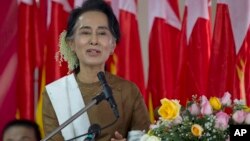Aung San Suu Kyi said Monday that building peace will be the first priority of her pro-democracy party's incoming administration when it replaces Myanmar's military-backed government soon.
Suu Kyi spoke at the headquarters of her National League for Democracy to mark the nation's Independence Day. She said the incoming government would seek to improve a ceasefire agreement the outgoing regime signed in October with eight ethnic minorities that have long fought for greater autonomy.
The ethnic rebellions remain a threat to the country's unity, since several larger ethnic guerrilla armies declined to sign the agreement. Fighting persists in some border areas. Though largely an agreement to keep talking, the agreement could pave the way for a more comprehensive political settlement in the future.
"The first responsibility of the next government is to build peace. We will organize an effective peace conference to improve the recent ceasefire agreement and we will urge widespread participation," she said in a speech lasting almost 15 minutes, her first major public address since the Nov. 8 election victory.
The NLD secured enough parliamentary seats in the last elections to oust a military-backed party that has been in power for five years. A clause in the 2008 military-directed constitution bars her from the presidency, but she has vowed to be the country's leader by proxy.
Despite the NLD's landslide victory, most analysts agree the party must have the support of the military establishment to be able to govern. By law, the military still has a quarter of the seats in Parliament, giving it veto power over all constitutional amendments. It also has a grip on all key security portfolios.
The transition will take place in February at the earliest, with Parliament's military bloc and the largest party in both houses — the NLD — proposing three candidates, one of whom will be elected president and the others becoming vice presidents. The president will then form a cabinet.
Suu Kyi has met several times since the polls with key members of the army and the outgoing military government, and all parties have made conciliatory statements about making a smooth transition of government.
"I would like to add again that our government will be a government based on a policy of national reconciliation and we will try to stick with that," Suu Kyi said Monday.
In a statement supporting her speech, her party executive committee said it was time to go forward and "build a peaceful, democratic federal union together."
It added: "We must learn from history and turn the page from the legacy of previous governments."










